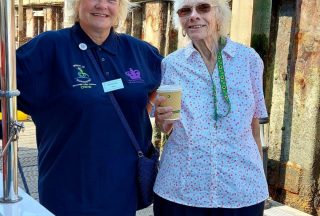Changing demographics and an aging population mean that 3 in 5 of us will be looking after a loved one at some point in our lives. If you are looking after a partner, adult child, relative or friend, here are some resources that can help you.
Looking after a partner
Looking after a partner can bring its own unique challenges. Many carers speak about finding it hard to come to terms with the change in roles, despite the closeness looking after someone can bring. You may also feel a sense of loneliness if you have to take control of the finances, home and organising medical professionals if your partner is unable to.
Remember no matter what you feel, your feelings are valid and taking time for yourself is incredibly important. If you are finding things hard, you are not alone. According to Carers UK research, almost half of carers say they’ve faced relationship difficulties because of their caring role – www.carersuk.org/news/10-facts-about-loneliness-and-caring-in-the-uk-for-loneliness-awareness-week
Relate has some great advice around building strong relationships, dealing with conflict, money problems and more. They also offer free online chats with counsellors, or over the phone – www.relate.org.uk
We have our Here to Talk service which gives you a chance to talk about how you feel with a trained volunteer, most who also have had caring experience – www.carersupportdorset.co.uk/here-to-talk
To sign up, call us on 0800 368 8349, or email admin@carersupportdorset.co.uk
Looking after a parent
If you are looking after a parent, it may be something you have done for a long time, or something that is new to you and a bit of a change in typical parent/child roles.
Often carers say they feel like the bond between them and their parent has changed due to the stresses of looking after someone, arranging care, going to hospital appointments and more.
Looking after someone can mean we forget what life was like before the other person’s health changed. Reminiscing can help you remember what you love about the other person, so dig out old photo albums or listen to music you once enjoyed together. Why not try a hobby you can both enjoy together, like drawing or painting, or find activities or groups that allow both you and who you look after to come along?
Looking after an older child
It may be that you are a parent carer and looking after your child who is now an adult themselves. There may be a lot of changes when your child turns 18, they may see different doctors or health professionals or be moving to a different education setting.
It is important to note that the general rights of parents and disabled children under 18 remain the same. This means that parents still have the right to request an assessment of their child’s needs – www.contact.org.uk/help-for-families/information-advice-services/social-care/how-to-access-services/needs-assessments
The local authority is still under a duty to arrange support and practical assistance in meeting those recognised needs subject to criteria – www.contact.org.uk/help-for-families/information-advice-services/social-care/what-is-social-care
If you are looking after an adult with autism, find support on the National Autistic Society’s website – www.autism.org.uk
If you are looking after an adult with a learning disability, find information and support on Mencap and Contact.
The NHS has a guide on changing from child to adult care when your child turns 18 – www.nhs.uk/conditions/autism/autism-and-everyday-life/changing-from-child-to-adult-care
Looking after a sibling
Many young carers or young adult carers often look after their siblings, which can bring its own set of challenges. If you are a young carer (under 16) you can find support on our young carer website, or if you are a young adult carer (16-25) you can find support on YACbook.
Sibs is also a great website supporting siblings of disabled children and adults.
- They have handy guides for adult siblings – www.sibs.org.uk/support-for-adult-siblings/guides
- Support and advice for child siblings – www.sibs.org.uk/supporting-young-siblings
Conflict with other family members or loved ones
If you’re looking after someone, it might begin to affect other relationships around you. It may be that you have less time to spend with other family members, partners or even your children. If you feel your relationships are suffering due to your caring role, remember to talk and be open with those people in your life. They may not know the true extent of what you’re going through, or how they can help you.
Issues with siblings may also arise. Barry J. Jacobs, an American clinical psychologist notes that sometimes “parents often have preferences for which child will be the primary caregiver, which may stir up resentments with siblings” – www.aarp.org/caregiving/life-balance/info-2019/conflicts-with-spouse-marriage
It can be helpful to agree to keep one another informed of any changes in your family member’s condition or needs, or even schedule family ‘meetings’ to discuss what is going on so everyone is in the loop.
You are not alone
No matter how you feel, looking after someone can bring its own set of challenges and rewards. What’s important is that you remember to be kind to yourself, take time for your own health and wellbeing, and reach out for support.
You can call us at Carer Support Dorset for information, advice, support or just a friendly voice at the end of the phone on 0800 368 8349.



